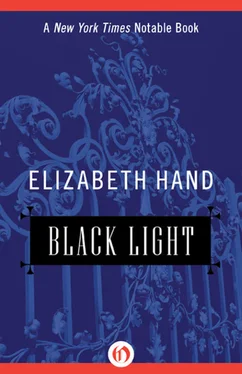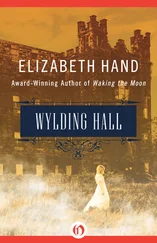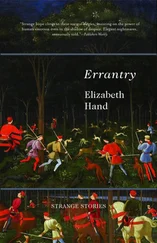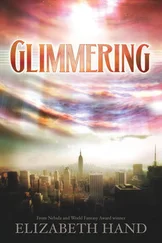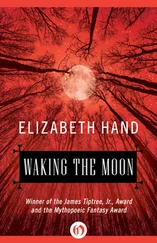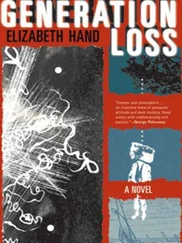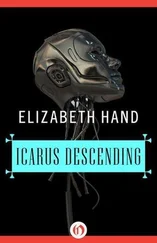Elizabeth Hand - Black Light
Здесь есть возможность читать онлайн «Elizabeth Hand - Black Light» весь текст электронной книги совершенно бесплатно (целиком полную версию без сокращений). В некоторых случаях можно слушать аудио, скачать через торрент в формате fb2 и присутствует краткое содержание. Город: New York, Год выпуска: 2012, ISBN: 2012, Издательство: Open Road Integrated Media, Жанр: Ужасы и Мистика, Фэнтези, на английском языке. Описание произведения, (предисловие) а так же отзывы посетителей доступны на портале библиотеки ЛибКат.
- Название:Black Light
- Автор:
- Издательство:Open Road Integrated Media
- Жанр:
- Год:2012
- Город:New York
- ISBN:978-1-4532-7897-0
- Рейтинг книги:5 / 5. Голосов: 1
-
Избранное:Добавить в избранное
- Отзывы:
-
Ваша оценка:
Black Light: краткое содержание, описание и аннотация
Предлагаем к чтению аннотацию, описание, краткое содержание или предисловие (зависит от того, что написал сам автор книги «Black Light»). Если вы не нашли необходимую информацию о книге — напишите в комментариях, мы постараемся отыскать её.
reveals a vision of ancient cults, gods, and fetishes—and a world where everyone loves an apocalyptic party
Lit Moylan lives what she thinks is an ordinary life. Sure, her town has a few eccentric theater types, but that’s all. That is until her Warholian godfather, Axel Kern, moves into the big house on the hill. He throws infamously depraved parties, full of drinks, drugs, and sex. But they also have a much more sinister purpose. At one of these parties, Lit touches a statue, and learns she has much more of a role to play in this world than she ever thought possible.
Ornate and decadent,
visits an irresistible world of ancient gods and secret societies as enthralling as it is dangerous.
This ebook features an illustrated biography of Elizabeth Hand including rare images and never-before-seen documents from the author’s personal collection.
The privileged daughter of famous television actors, Charlotte, “Lit,” Moylan is ready to enjoy one last wild fling before college and adulthood. In fact, the whole idyllic hamlet of Kamensic, New York, is ready to party, for legendary avant-garde film director—and Lit’s godfather—Alex Kern is coming back to reopen his fabulous mansion, Bolerium. But it won’t be just any party. It’ll be the event of all time.
The whole town is invited, young and old, famous and obscure. But other, more disturbing guests are arriving, too—seen at the edges of the forest, at the margins of the night. Kern’s connections extend far beyond Hollywood, beyond even the modern age… and in Bolerium’s echoing halls a fearsome confrontation is gathering, between ancient powers of the darkness and those sworn to stop them at any cost, no matter what—or who—the sacrifice… even an innocent girl.
Hand does for upstate New York what Stephen King has done for rural Maine in this well-written but decidedly creepy dark fantasy about a Bohemian bedroom community and artists’ colony located about an hour from Manhattan by train. Seventeen-year-old Charlotte “Lit” Moylan, the daughter of two successful but second-rate TV actors, has never thought much about the oddities of her home town of KamensicAthe strangely decorated Congregational Church, for example, or the community’s unusual Halloween tradition, or the high number of suicides among the area’s younger citizens. Although she looks forward to going away to college next year, she’s basically content with her life. Then Kamensic’s most notorious citizen returns to his roots. Alex Kern, the successful avant-garde film director, brings with him a reputation for scandalous, extravagant and decadent parties, replete with perverse sexuality and heavy drug use. His mazelike mansion, Bolerium, sits on the hill overlooking Kamensic like some dangerous predatory beast. Eventually Lit and, indeed, everyone in town receives an invitation to a party, a gala event that, Hand hints, may be nothing less than a prelude to the Apocalypse. Something of a latter-day Aubrey Beardsley in prose, Hand has a talent for portraying forbidding millennial settings brimming with perverse antiheroes, suffering innocents and sadistic demigods. This book, although not quite the equal of her last two novels, Waking the Moon and Glimmering, should strongly appeal to aficionados of sophisticated horror.
Copyright 1999 Reed Business Information, Inc.
Amazon.com Review
From
Although Charlotte Moylan thinks she lives a rather ordinary and oftentimes dull life, the reality is far different. Her father is best known as the famous TV personality Uncle Cosmo, and her mother is a 20-year veteran of the daytime drama
. They live in the New York community of Kamensic, an artistic enclave where the church is rarely used for religious ceremonies and where death is an “occupational hazard” for the young. The town is also home to Bolerium, a dark manor of indeterminate origin where the enigmatic and somewhat sinister film director Axel Kern lives when he’s not making movies.
Axel is Charlotte’s godfather, but he’s one guardian who may not be looking out for her best interests. Aside from making questionable films, Axel is also in cahoots with the old gods, and is interested in bringing a couple of them along with him to Kamensic. This puts the town—and Charlotte—at the center of an age-old struggle between two Illuminati-style groups, the more-or-less benign Benandanti (seen in Hand’s Tiptree Award-winning
) and their rivals, the Malandanti witches. As has become Hand’s modus operandi, she tells this story with a luxurious prose that’s at once beautiful and also somehow intellectually decadent. Although the book may be a bit slow-paced for some, those who enjoy a smart novel that’s rich in style and substance won’t want to miss it. —Craig E. Engler
